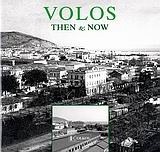Volos
Then and Now
Βόλος. Τότε και τώρα
Volos, the seaport of central Greece, is almost equidistant from the country's two large urban centres, Athens and Thessaloniki. However you approach Volos, you see a modern city built on an inlet of the Pagasitikos Gulf, at the foot of verdant Mt Pelion. It is true that Pelion and the sea have not only influenced the physical aesthetics of the city, they have also contributed significantly to shaping its economic and social character, especially during the early decades. Volos is a young city. It was established in the first half of the 19th century, when the phenomenon of urban growth or urbanism first appeared in the region. It was initially commercial in nature, since the main reason for living there was the existence of the natural harbour that served the commercial interests of its early settlers, a group of merchants who had come from Pelion and from centres of the Hellenic Diaspora. Up to that time, there were two main focal points for all activities in the region: a) the citadel or fortress, once seat of the Ottoman administration, in today's district of Ayii Theodori, and b) the communities of Pelion, which were important centres of the neo-Hellenic Enlightenment. The establishment of Volos, the main purpose of which was to exploit its harbour for trade purposes, led to the decline of these other two points and made the new city the financial capital of the Thessalian hinterlands in the early decades after it was incorporated into the Hellenic State in 1881. [...] (The Port City of Thessaly)
- ISBN978-960-8154-53-7
- Ημ/νια Έκδοσης2006
- Σελίδες163
- ΔέσιμοΣκληρό εξώφυλλο
- Γλώσσα ΠρωτότυπουΕλληνικά
- Διαθέσιμες Γλώσσες
- Κατηγορίες Βιβλίου
- Θεματολογίες Βιβλίου
- Συγγραφέας
- Εκδότης
Σχετικά Βιβλία

Μετάφραση και περιοδικός τύπος στον 19ο αιώνα
Συλλογικό έργο
Εθνικό και Καποδιστριακό Πανεπιστήμιο Αθηνών. Φιλοσοφική Σχολή. Τμήμα Θεατρικών Σπουδών






